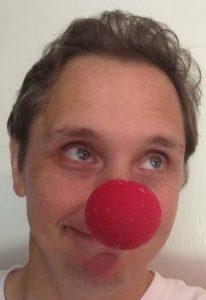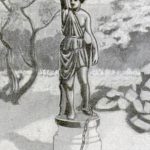My wife and I sat in the crowded hospital lobby waiting. I was clutching a pager. When it went off we would be called to another, smaller waiting area because you can’t go into surgery without having to wait and wait and wait. An older gentleman sharing the curved row of seats struck up a conversation with us, and by “struck up a conversation” I mean “gave us a meandering soliloquy about his time in the pre-seventies country music industry”. I tried to convey to him with my facial expressions that I was impressed even though I didn’t know the names he was dropping from Shinola, but he only stared at the table in front of us, gesturing as he wove through his tangled memories. He talked about his good friend Jack Greene whom I’d never heard of, and who wrote the song “Statue of a Fool”, which I’d never heard of in spite of its being so popular when it was first released in 1969 that it was the Country Music Association’s Song Of The Year. “And then,” he said, his dark eyes brightening behind his thick glasses, “it stayed so popular it was Song Of The Year the next year too. Only song in history to ever do that.”
It seemed like an omen. Months earlier when my second orchiectomy was scheduled, then postponed because my blood pressure was so high a paper cut could produce a scene from Evil Dead II, then rescheduled, I’d come to terms with it emotionally by thinking of it as an end. Dexter had been cut away and with Lefty gone I’d be a proper gelding and the whole cancer experience could be put out to pasture. Except, as I keep reminding myself, there is no end. With any luck I won’t have to have any more bits cut away—although it will be at least several more months before the plastic port that was installed just below my right clavicle can be removed. And I still have scars that will probably be permanent, and be permanent reminders of the sharp divide in my life: before cancer, when I could take my health for granted, and after cancer. Now I can’t take anything for granted. “Statue of a Fool” broke records the year I was born.
I thought about that when the pager buzzed. It had buzzed earlier when I’d had to go back for my initial check-in, rattled off my name and date of birth, and been given a wristband—a procedure I’d been through so many times I didn’t even need to think about where I was going. A nurse led me, my wife, and a small group of other soon-to-be patients and family to an elevator then through familiar corridors to a familiar waiting room. This one was smaller, quieter, and with windows that looked out at buildings I pass every day on my way to work. I think I even sat in the same corner seat I occupied when I was in the same room waiting for my previous surgery. Then I was called back to the familiar pre-op area. The familiarity of everything really hit me when the same woman who’d taken my blood pressure before my previous surgery took my blood pressure then handed me a plastic bag for my clothes, a hairnet, a paper gown, and a pair of yellow socks. I have a dozen pairs of the same kind of socks. She slid the curtain closed to give me privacy. I didn’t need to be told what to do, but I sat down on the bed, still fully clothed, for just a moment.
I’ve always thought of myself as an exceptionally lucky guy. My friends have thought so too. Once a friend and I were evacuated from an apartment complex because a gas leak set off the fire alarm. We stood around the parking lot like a couple of yutzes wondering if the building might explode.
“If it does,” said my friend, “my super reflexes will allow me to duck behind a car before any of the explosion hits me.” Then he looked at me. “It’ll all just fly around you.”
It’s a memory that’s come back to me repeatedly because I’ve felt so lucky throughout my cancer experience. At the beginning one of the doctors said to me, “You’ve got one of the best cancers there is.” There may not be such a thing as a good cancer, but it could have been worse. That same doctor told me I had a really good chance of being cured. I’d never heard the word “cured” applied to cancer before, and I repeated it a lot before I realized it was giving me a false sense of hope. I can’t say I am or will be cured because that implies that I’ve reached an end, that there’s nothing else that needs to be done. For the rest of my life there will always be another pill, another procedure.
I looked around at the pre-op room, at the yellow socks, the gown that I knew from experience I wouldn’t be able to fully tie in the back, but I’d spend most of the next few hours lying down so I wouldn’t need to worry about my ass being exposed. I looked at the hairnet. And then I started to undress and put my clothes in the plastic bag. For a moment I’d been on the verge of breaking down. I thought I was okay, but then the familiarity of everything crashed down on me, and I thought, I don’t want to go through this again. Then I slipped the hairnet over the hair that, a few months before, hadn’t been there, and adjusted the paper gown as best I could. As I lay back I heard machines beeping. Soon I’d be hooked up to a machine that would beep and trace a similar pattern for every heartbeat. I thought about how grateful I should be, how lucky I was to still be here. And I felt like a fool.








Have I told you what an awesome person you are? Because you are. And the fact that you keep dropping by to give me support when you’ve got so much on your own plate humbles me. By the way, when I read “You’ve got the best cancer there is,” it got stuck in my head in Pee-Wee Herman’s voice. Try it.
That means so much to me. I didn’t want cancer, but I’ve taken it as an opportunity to support others. Or perhaps it just gives extra weight to the support I’ve always wanted to offer. And you make me laugh on a regular basis so that’s also my way of giving back. I can’t remember what the doctor who told me I had the “best cancer” looked like, but from now on I’ll always picture him as Pee-Wee Herman. In a doctor’s coat.
Oh man, I think a smack down is going to happen between you and a friend who has(or had) thyroid cancer. He was told that HIS cancer was the best one. Who even decides these things anyway?
I’m not a big country music fan but I heard it a lot growing up. Still, I had never heard of “Statue of a Fool” but I just listened to it on YouTube. What an interesting pre-surgery conversation. What if the guy had written a different song, like, “SuperFreak”. Would you still think it was a sign? Kidding.
I’m glad you’ve made it through all this unpleasantness. Stay well my friend.
Cancer sucks. There’s just no other way of putting it.
So I didn’t realize Ricky Van Shelton’s Statue of a Fool was a remake. I remember when Ricky’s version came out, it was shortly after I graduated from high school.
The crazy thing is I’ve never heard the song–or at least I hadn’t until I looked it up on YouTube while writing this. Or maybe I had heard it and it just didn’t register because, well, it sounds an awful lot like a lot of other country songs.
Well don’t you live in Nashville?? 😉
I do–I think that’s why I miss so much country music. It’s only noticed by the tourists. 🙂
You’re an inspiration. Such a great attitude even in the midst of not-so-perky thoughts and feelings. I really like how honest you are and what a neat connection to make between the stranger’s story and you and how you feel you’re processing all of this as a human.
It’s never something I’ve consciously done, but I’ve always hoped that my experience will benefit others in tough circumstances. There was a lot I didn’t know going in, and no two people will have the same experience, but hopefully I can use even little things to assure and help others. And I love it that everyone has a story.
The way you write about your hospital experiences — with grace, eyes wide open, soul, humor, and depth — matters a great deal, Chris. Your writing helps those who read you, even veterans like me, who has said to herself a kashmilliom times, “I don’t want to go through this again.” Please remember that, every moment, because that’s truly record-breaking.
A pessimist doesn’t see anything positive in the saying “Misery loves company”, but it’s nice to know that others have had similar feelings. It’s reassuring. There’s another saying that I think is better–sorrow shared is sorrow halved.
Wow. Just wow.
Best of luck in your recovery. I would avoid jumping over the gap, at least for the time being…
PS my grandfather also had the best type of cancer there is–colon cancer with surgery only. Could an oncologist conspiracy be brewing?
Thanks, and I’m not going to argue with anyone about what the best cancer is. I’ve heard from quite a few people that their other cancers were also described as “the best one to have”. Hey, the best cancer is no cancer.
Thanks for the contribution you are making to cancer patients and their families. Humour is ‘big medicine’ in cancer recovery. Have you read Erma Bombeck’s Book “I Want to Grow Hair, I Want to Grow Up, I Want to Go to Boise”?
My daughter is a cancer survivor. My good friend will soon die from it. Similar journeys, different endings – but both found a place of peace and a sense of purpose that I believe comes as a result of having cancer. Is that what you are finding too?
I love Erma Bombeck, and yet somehow I’ve missed “I Want to Grow Hair, I Want to Grow Up, I Want to Go to Boise”. I know she fought breast cancer. I’ll have to look that up. Humor was one of the big things that kept me going. If I hadn’t been able to laugh about my own cancer experience it would have been so much harder to get through. Yes, it did give me a sense of both peace and purpose. I want to be defined by more than just cancer–I cover a wide range of topics here–but I also want to help others.
I’m sorry you’re about to lose a friend, but also glad your daughter survives. That’s the nature of fighting the crab: sometimes we win, sometimes we lose.